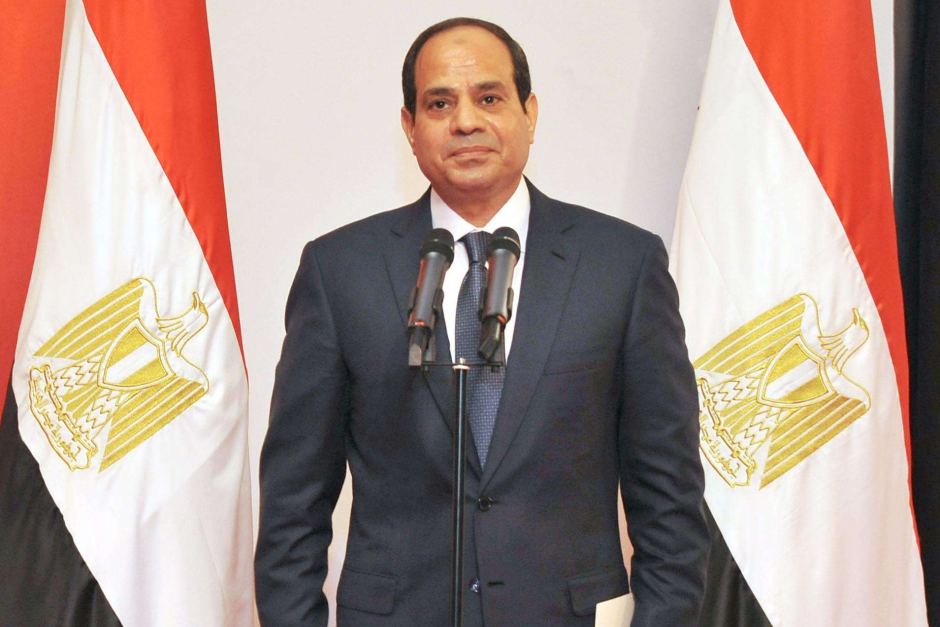Category: Media / Law, Crime and Justice
New Egyptian law establishes media regulator picked by President
Tuesday, 27 Dec 2016 09:37:12

Former army chief Abdel Fattah al-Sissi will pick the members of the new Supreme Council. (AFP:HO/Egyptian presidency)
Egyptian President Abdel Fattah al-Sisi will pick a chairman and members of a new media council under a law passed on Monday (local time), giving the body the power to fine or suspend publications and broadcasters.
The law, approved by Parliament and signed into law by President Abdel Fattah al-Sisi, creates the so-called Supreme Council for the Press and Media.
The council will also be able to give or revoke licences for foreign media.
The council's chairman will be picked by Mr Sisi and remaining members will be appointed by him based on nominations from various bodies, including the judiciary and Parliament.
Human rights organisations and the New York-based Committee to Protect Journalists have repeatedly criticised media freedoms in Egypt, which jailed the second most journalists of any country in the world in 2015, according to the CPJ.
The new council is tasked with suing media organisations that violate its regulations.
It will also create a list of penalties, fine media organisations that break licence terms, and can revoke or suspend the right to publish or broadcast.
It will ensure fair competition between media groups as well as their independence and neutrality, adherence to journalistic ethics, and will make sure they do not compromise national security, the Official Gazette in which the law was published said.
Yehia Qalash, chief of the press syndicate, said the law and the council were mostly concerned with administrative affairs and did not compromise media freedoms.
More media laws set to be debated
Parliament was still debating other media legislation, Mr Qalash said.
A second media law will cover sentencing, freedom of information, confidentiality of sourcing and the relationship between journalism and national security, lawmakers and press syndicate members said.
The press syndicate had lobbied for a single media law encompassing all issues but Parliament decided on two separate laws.
Only days before, the Interior Ministry said it had arrested an Al Jazeera news producer, accusing him of "provoking sedition" on behalf of the Qatar-based broadcaster.
Australian Peter Greste was released in February 2015 after 400 days in a Cairo prison.
In August of that year, he was tried in absentia and charged with supporting the Muslim Brotherhood and operating in Egypt without a licence.
His colleagues Mohamed Fahmy and Baher Mohamed were pardoned and released, following years of international lobbying.
Police raided the Egypt's press syndicate offices in Cairo in May and arrested two journalists critical of the Government.
A court in November found the syndicate leadership, including Mr Qalash, guilty of harbouring criminals and sentenced them to two years in prison in relation to the incident.
Mr Qalash has appealed and is out of detention on bail.
The Government says it respects media freedom and all jailed journalists are facing criminal charges unrelated to their work.
Reuters
- About Us
- |
- Terms of Use
- |
-
 RSS
RSS - |
- Privacy Policy
- |
- Contact Us
- |
- Shanghai Call Center: 962288
- |
- Tip-off hotline: 52920043
- 沪ICP证:沪ICP备05050403号-1
- |
- 互联网新闻信息服务许可证:31120180004
- |
- 网络视听许可证:0909346
- |
- 广播电视节目制作许可证:沪字第354号
- |
- 增值电信业务经营许可证:沪B2-20120012
Copyright © 1999- Shanghai Daily. All rights reserved.Preferably viewed with Internet Explorer 8 or newer browsers.




 Send to Kindle
Send to Kindle